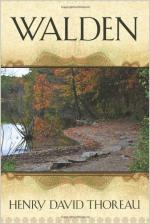|
|
Walden Former Inhabitants; and Winter Visitors
In the winter he rarely saw anyone, and had to think back to former inhabitants of the area around Walden to keep himself company:
Cato and Zilpha Ingraham, Brister and Fenda Freeman, the Stratten family homestead, Breed's hut, Wyman the potter, Col. Hugh Quoil.
Topic Tracking: Intellectual Space 6
Many of the people in this list were former or freed slaves, people at the end of their lives or careers who were hanging on to their former glory, or people on the fringe of society. All these people once lived here, but no village ever formed like the village of Concord. Thoreau wonders why:
"I am not aware that any man has ever built on the spot which I occupy. Deliver me from a city built on the site of a more ancient city, whose materials are ruins, whose gardens cemeteries. The soil is blanched and accursed there, and before that becomes necessary the earth itself will be destroyed. With such reminiscences I repeopled the woods and lulled myself asleep." Winter Visitors, pg. 218
The snow closed Walden in, but made it possible to make very exact paths through the woods. Thoreau took the exact same steps for a week on one of his paths before the weather changed and wiped out his footprints. Despite the snow, he kept his appointments with his trees, some a ten-mile hike through the woods.
On one walk he encountered a barred owl. Thoreau made a lot of noise to get him to wake up but the owl barely did, and then finally just flew away to another tree to go back to sleep undisturbed. Even in the dead of winter, Thoreau could inevitably find some living plant life, or a hardy bird.
He also spent time with the "long-headed farmer," who was a deeply moral and religious man. There was also the poet who is mentioned before, who came at all hours of the night, simply because he was in need of visiting. He brought noise and laughter and busy-ness to Walden, as well as deep philosophical discussions.
A. Bronson Alcott also began to come often during the winter to talk and sit. Thoreau thought he was an exceptional man, a philosopher of great faith, and an optimist. He was also free, and not tied to any institution of society. They had many amazing and heady and weighty conversations.
Emerson also came, as they had spent many "solid seasons" together in the village previous to Thoreau moving to Walden.
"There too, as every where, I sometimes expected the Visitor who never comes. The Vishnu Purana says, 'The house-holder is to remain at eventide in his courtyard as long as it takes to milk a cow, or longer if he pleases, to await the arrival of a guest.' I often performed this duty of hospitality, waited long enough to milk a whole herd of cows, but did not see the man approaching from the town." Winter Visitors, pg. 222




